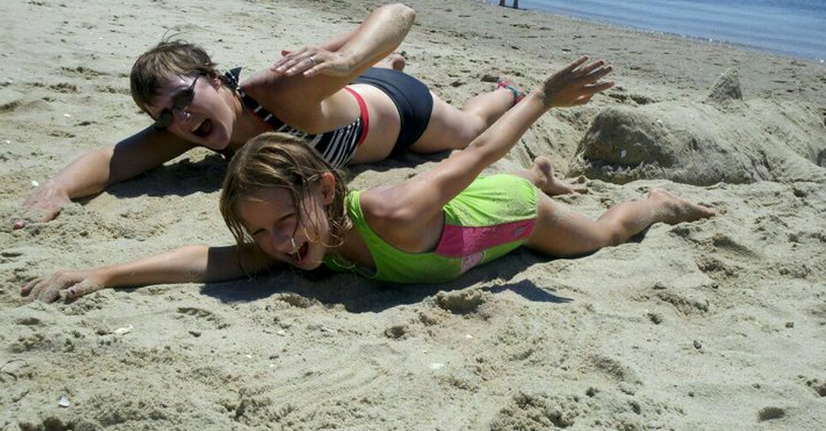A couple of weeks ago, I started exercising again. I hate even typing that sentence because it means that, even after getting into relatively good shape and running a 10k for the first time, it should be clear that I must have quit exercising if I had to “start up” again. And while I didn’t really “quit”—-I had a lingering, mystery virus that derailed me—-it sure felt like I was starting from the bottom when I finally laced up my running shoes again and hit the road.
I’ve lived this pattern most of my adult life: 1. Get motivated. 2. Exercise like crazy (and tell everyone I know all about it until they are ready to scream or unfriend me). 3. Get hurt/sick/busy enough to get derailed for a week/month/year. 4. Feel bad about myself until I circle around to #1 again.
But one thing that hit me as I was again circling around to #1 in my “Stages of Fitness”, was how much my experience homeschooling has helped me deal with these relatively small setbacks. Yes, this teacher has been schooled. Keep reading if you want to know what lessons I’ve learned to take to heart.
1. It’s not a sprint, it’s a marathon.
This is an often-shared piece of advice in homeschooling circles. It helps those of us who start panicking over the progress (or lack thereof) our kids are making in any given subject by reminding us to step back and look at the big picture. I daresay that most homeschooling parents would say that they are more interested in raising curious, intelligent, and literate children, and not just trying to have kids who are on lesson 45 of their grammar book by February 1st.
I love how this advice applies to fitness and exercise. My ultimate goal is to live a long, healthy, active life, not just fit into my “skinny jeans” or even finish another 10k, right? In the grand scheme of things, getting derailed from any exercise program for a bit of time isn’t the end of the world–just pick up and keep on going. This long-term goal keeps me from acting like a missed workout is the end of the world.
2. Get the hard stuff done early.
I’ve learned that if we don’t do our hardest subject (math) first thing in the morning, it looms over our heads like a gloomy (math) cloud. And then, by the time we get to tackling it (math), we’re all tired, cranky, and that one subject (math) take about five times longer than it should.
For me, at least, the same can be said for running. It is much, MUCH better for me to get up and run out the front door before I do anything else (OK, sometimes I do need a sip of coffee first).
The same goes for my 30-Day Shred days: I’d pop on that Jillian Michaels’ video before the kids were even out of bed, get it done in under a half hour, and then collapse in front of my laptop feeling a wee bit smug that I was “done” for the day.
3. Pick a curriculum that works (for you).
I will never reveal how much curriculum I’ve purchased because someone else raved about it, only to then resell the barely touched books because it just isn’t right for us. It’s just too embarrassing and makes me look a bit gullible and indecisive. But, when a friend tells me about a great curriculum they are using for spelling (a subject we’ve been pathetic at covering), it’s easy for me to overlook the fussy manipulatives, the multi-step daily instructions, and the steep learning curve in an effort to just “get something that works”. But it doesn’t work if it just sits on the bookshelf, does it?
I was reminded that I need to be wary of “hot trends” in exercise too, especially when all the warning bells should be ringing: This Isn’t Right For Me (e.g., Zumba). I just stopped myself from purchasing P90X (but look how pretty their bodies look!) when I realized that I’d never, ever push myself that hard for a six-pack. Never.
4. Grades are just one measure of success.
We don’t “do” formal grading, though I obviously check the kids work and, when pressed by them, will give them a letter grade. But, even if they were in school, I’m sure I’d be telling them that it isn’t only about the grade. It’s about effort, and enthusiasm, and retention.
I don’t get graded for running (thank goodness!) or situps (ditto!), though I’d say that any time I step on that cursed scale, I feel like I’m giving myself a grade. I lost 3 pounds? A+!!! Gained 5? FAIL!
I’d never let my kids feel like their intelligence is all about a letter grade. And I’m not going to let my fitness progress be defined by a number on a scale, or the size jeans I’m wearing, or even how many sit ups I can do.
5. If everyone is crying, I’m doing something wrong.
I admit to posting Facebook updates that read something like, “If one more kid cries over their math workbook, I’m going to call the public school in the morning!” Teaching my own kids subjects like history, science, and math can be, simply, Not Fun At All.
BUT, I don’t homeschool to have sullen, miserable kids around me all day long. I want to have fun with them. I want to see them light up when they learn something new, or we do a fun experiment or project. I want to give them breaks to play, pet the dog, or just run around the house.
That’s why I run/walk. For me, running nonstop is torture on my asthmatic lungs and my knobby knees. But running with walk breaks is just more fun for me. It gives me time to catch my breath and look around outside. It allows me to run longer and farther which feels like a victory to me. It keeps me from crying, sometimes literally, sometimes figuratively.
And it also gets me to a certain level of fitness that allows me to then go for a long bike ride with the family in Acadia National Park, or scooter down the street with my son, or even kick my girls’ butts in a Just Dance dance-off in our family room.
No pain, no gain? Yeah, I’m with this to some degree. But if that also means “no fun”, I won’t be sticking with it for long.
Now, if you’ll excuse me, I need to start homeschooling this morning. Maybe that’s another lesson I’ve learned that I can apply to exercise: Step away from the computer if you really want to get stuff done.
————————————-
 I’ve partnered with Harvard Pilgrim on this sponsored post (and others to come!), though the thoughts, opinions, and advice expressed are my very own. Want to find even more ways to be well? Check out HarvardPilgrim.org/CountUsIn.
I’ve partnered with Harvard Pilgrim on this sponsored post (and others to come!), though the thoughts, opinions, and advice expressed are my very own. Want to find even more ways to be well? Check out HarvardPilgrim.org/CountUsIn.




 Follow
Follow

